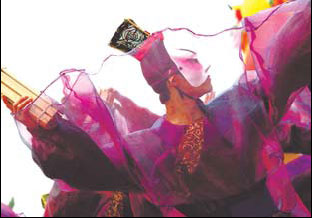Life and Leisure
The town that shaped a Confucian thinker
By Wang Ru (China Daily)
Updated: 2010-11-11 08:05
 |
Large Medium Small |
Did the great thinker bring glory to his birthplace, or was it the magic of the place that produced the greatness?
I came up with this question while standing atop Hongyeling, or Red Leaves Mountain, where autumn had turned the Smoke Trees into a flaming sea.
|
|
I had traveled to Anze county in Shanxi province to discover more about the philosopher Xun Zi (312-230 BC) and explore his beautiful hometown.
All humans are born evil and are inclined to selfishness, and only rigorous education and laws can guide us, Xun believed. He was born Xun Kuang and is considered to be one of the pre-eminent Confucian thinkers.
Shanxi is famous for two things, natural resources underground and historical sites on the ground.
Since the high-speed train started service in 2009 between Beijing and Shanxi, there has been an increase in the number of visitors heading to sites such as the magnificent city wall of Pingyao, and Suspended Temple that hangs from a cliff in Datong.
It now takes three hours by train from Beijing to Taiyuan, capital city of Shanxi province, and then a coach trip of four hours to Anze, on the lower reaches of the Fenhe River.
The county with a population of 80,000 held little attraction for most visitors before 2005, when the local government developed a ceremony worshipping Xun into an annual event in October called the Xun Zi Cultural Festival.
A landmark 28-meter-tall statue of Xun overlooks Anze's Xun Zi Cultural Park, a 47-hectare spread of temples, memorial squares and a great hall exhibiting his works and life stories.
|
|
The statue can be reached by car or climbing a footpath of 980 stone steps. The buildings inside the park were built in the Warring States Period (475-221 BC) style.
The festival attracts both domestic and overseas tourists, and scholars studying the theories of Confucianism.
Unlike many idealistic Confucianists, like Mencius, who claimed all humans were inherently good, Xun argued that humans need a good education and should be guided by laws.
Born in the Warring States Period, Xun's philosophy was influential at the time.
Little is known about Xun's early life. He taught in the State of Qi, in present day Shandong province, and his two most notable students were Li Si and Han Fei Zi, who later developed a doctrine called the School of Law or Legalism.
One of Xun's most important legacies is his 32-chapter book Xun Zi, in which he discussed philosophy, logic, politics, social ethics and many other aspects of human society.
The annual festival comprises a calligraphy exhibition, seminars and the ceremony, which this year included hundreds of dancers dressed in traditional imperial Chinese costumes.
About 20 km away from downtown Anze the well-preserved natural environment is a magnet for rare birds like storks.
Driving the mountain roads in the cool air, under the golden sunlight melting into the autumn leaves, is a relaxing experience, quite different from watching the leaves turn color in overpopulated Fragrant Hills, in Beijing.
China Daily

